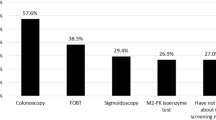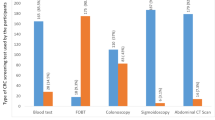Abstract
Colorectal cancer is an important disease because of its severity and also since it affects much of the population. Nothing helps patients and doctors to determine the risk of suffering from colorectal cancer during their lives, except for medical tests such as the colonoscopy. There have been several studies and research to try to estimate the relative risks of colorectal cancer based on various factors and the applications to calculate the risk of this cancer, but these are not within everyone’s research. This project offers a multilingual Web tool, called ColoRectal Cancer Alert (CRCA), to calculate the risk of colorectal cancer for life in men and women of white race. With this application, doctors can carry out research in a few minutes to explore this risk when they are seeing a patient. The platform is designed in such a way that anyone can use it. It is easy to use and intuitive. We should keep in mind that this tool does not replace diagnostic tests such as the colonoscopy or the sigmoidoscopy. It is designed so that users with the assistance of their doctor know the risk and act accordingly (for example, having more checkups on the disease in case of high risk). To access the tool a computer with Internet connection will be required. Currently, 250 users of white race under the supervision of a specialist have completed the questionnaire.





Similar content being viewed by others
References
American Cancer Society. Retrieved January 20, 2011, from http://www.cancer.org.
Lakatos, P. L., David, G., Pandur, T., Erdelyi, Z., Mester, G., Balogh, M., Szipocs, I., Molnar, C., Komaromi, E., Kiss, L. S., and Lakatos, L., Risk of colorectal cancer and small bowel adenocarcinoma in Crohn’s disease: A population-based study from western Hungary 1977–2008. J. Crohns Colitis 5(2):122–128, 2011.
Levin, B., Lieberman, D. A., McFarland, B., et al., Screening and surveillance for the early detection of colorectal cancer and adenomatous polyps. Cancer J. Clin., 2008.
Winawer, S. J., Zauber, A. G., Fletcher, R. H., et al., Guidelines for colonoscopy surveillance after polypectomy: A consensus update by the US Multi-Society Task Force on Colorectal Cancer and the American Cancer Society. Cancer J. Clin. 56:143–159, 2006.
Liljegren, A., Lindgren, G., Brandberg, Y., Rotstein, S., Nilsson, B., Hatschek, T., Jaramillo, E., and Lindblom, A., Individuals with an increased risk of colorectal cancer: Perceived benefits and psychological aspects of surveillance by means of regular colonoscopies. J. Clin. Oncol. 22, 2004.
Suchy, J., Kłujszo-Grabowska, E., Kładny, J., Cybulski, C., Wokołorczyk, D., et al., Inflammatory response gene polymorphisms and their relationship with colorectal cancer risk. BMC Cancer 8:1–7, 2008.
Freedman, A. N., Slattery, M. L., Ballard-Barbash, R., Willis, G., Cann, B. J., Pee, D., Gail, M. H., and Pfeiffer, R. M., Colorectal cancer risk prediction tool for white men and women without known susceptibility. J. Clin. Oncol. 27(5):686–693, 2009.
Park, Y., Freedman, A. N., Gail, M. H., Pee, D., Hollenbeck, A., Schatzkin, A., and Pfeiffer, R. M., Validation of a colorectal cancer risk prediction model among white patients age 50 years and older. J. Clin. Oncol. 27(5):694–698, 2009.
Colorectal Cancer Risk Assessment Tool. Retrieved January 22, 2011, from http://www.cancer.gov/colorectalcancerrisk.
Colorectal Cancer Risk Assessment—Healthline. Retrieved January 20, 2011, from http://www.healthline.com/sw/rsk-colorectal-cancer-risk-assessment.
Cáncer de colon—Siteman cancer center. Retrieved January 22, 2011, from http://www.yourdiseaserisk.wustl.edu/hccpquiz.pl?lang=spanish&func=home&quiz=colon.
Slattery, M. L., Edwards, S. L., Ma, K. N., et al., Colon cancer screening, lifestyle, and risk of colon cancer. Cancer Causes Control 11:555–563, 2000.
Lubbe, S. J., Webb, E. L., Chandler, I. P., and Houlston, R. S., Implications of familial colorectal cancer risk profiles and microsatellite instability status. J. Clin. Oncol. 27:2238–2244, 2009.
Andrieu, N., Launoy, B., Guillois, R., Ory-Paoletti, C., and Gignoux, M., Familial relative risk of colorectal cancer: A population-based study. Eur. J. Cancer 39(13):1904–1911, 2003.
Bravi, F., Edefonti, V., Bosetti, C., Talamini, R., Montella, M., et al., Nutrient dietary patterns and the risk of colorectal cancer: A case-control study from Italy. Cancer Causes Control 21(11):1911–1918, 2010.
Spencer, E. A., Key, T. J., Appleby, P. N., Dahm, C. C., Keogh, R. H., et al., Meat, poultry and fish and risk of colorectal cancer: Pooled analysis of data from the UK dietary cohort consortium. Cancer Causes Control 21(9):1417–1425, 2010.
Park, Y., Subar, A. F., Kipnis, V., et al., Fruit and vegetable intakes and risk of colorectal cancer in the NIH-AARP diet and health study. Am. J. Epidemiol. 166:170–180, 2007.
Toriola, A. T., Jari, S. K., Laukanen, A., Mazengo, C., and Kauhanen, J., Alcohol consumption and risk of colorectal cancer: The Findrink study. Eur. J. Epidemiol. 23(6):395–401, 2008.
Leufkens, A. M., Van Duijnhoven, F. J. B., Siersema, P. D., Boshuizen, F. C., et al., Cigarette smoking and colorectal cancer risk in the European Prospective Investigation into Cancer and Nutrition Study. Clin. Gastroenterol. Hepatol. 9(2):137–144, 2011.
Butterworth, A. S., Higgins, J. P., and Pharoah, P., Relative and absolute risk of colorectal cancer for individuals with a family history: A meta-analysis. Eur. J. Cancer 42(2):216–227, 2006.
Kelvin, K. F., Pau, C., Wu, W. K., Chan, F. K., Griffiths, S., and Sung, J. J., Cigarette smoking and the risk of colorectal cancer: A meta-analysis of prospective cohort studies. Clin. Gastroenterol. Hepatol. 7:682–688, 2009.
Cronin, K. A., Gail, M. H., Zou, Z., et al., Validation of a model of lung cancer risk prediction among smokers. J. Natl Cancer Inst. 98:637–640, 2006.
Hamilton, W., Lancashire, R., Sharp, D., Peters, T. J., Cheng, K. K., et al., The risk of colorectal cancer with symptoms at different ages and between the sexes: A case-control study. BMC Med. 7(1):1–9, 2009.
Schatzkin, A., Subar, A. F., Thompson, F. E., et al., Design and serendipity in establishing a large cohort with wide dietary intake distributions: The National Institutes of Health-American Association of Retired Persons Diet and Health Study. Am. J. Epidemiol. 154:1119–1125, 2010.
Rennert, G., Rennert, H. S., Pinchev, M., Lavie, O., and Gruber, S. B., Use of hormone replacement therapy and the risk of colorectal cancer. J. Clin. Oncol. 27, 2009.
Galeone, C., Turati, F., La Vecchia, C., and Tavani, A., Coffee consumption and risk of colorectal cancer: A meta-analysis of case-control Studies. Cancer Causes Control 21(11):1949–1959, 2010.
Hughes, D. J., Hlavatá, I., Soucek, P., Pardini, B., Naccarati, A., Vodickova, L., Jenab, M., and Vodicka, P., Variation in the vitamin D receptor gene is not associated with risk of colorectal cancer in the Czech Republic. J. Gastrointest. Cancer, 2010.
Moore, H. G., Colorectal cancer: What should patients and families be told to lower the risk of colorectal cancer? Surg. Oncol. Clin. N. Am. 19(4):693–710, 2010.
Acknowledgements
This work has been partially supported by the Department of Health, Government of Castile and Leon (Spain) under the project GES39/VA05/10. Also, part of this work has been supported by the Instituto de Telecomunicações, Next Generation Networks and Applications Group (NetGNA), Portugal.
Author information
Authors and Affiliations
Corresponding author
Rights and permissions
About this article
Cite this article
de la Torre, I., Díaz, F.J., Antón, M. et al. A Telematic Tool to Predict the Risk of Colorectal Cancer in White Men and Women: ColoRectal Cancer Alert (CRCA). J Med Syst 36, 2557–2564 (2012). https://doi.org/10.1007/s10916-011-9728-8
Received:
Accepted:
Published:
Issue Date:
DOI: https://doi.org/10.1007/s10916-011-9728-8




